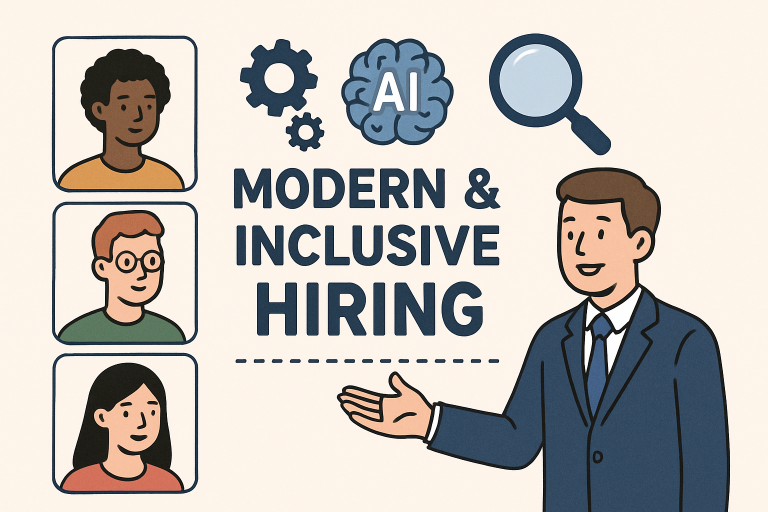Raising the Bar for Modern Hiring
Introduction
In today’s rapidly evolving job market, companies face the challenge of standing out in pursuing top talent. The stakes are high; attracting the right candidates is not just about filling vacancies but fostering a workplace poised for innovation and growth. With trends such as fake job applicants reshaping expectations for both employers and candidates, modern hiring strategies must adapt to a new landscape of agility, transparency, and technology.
Employers now realize that the pathways to securing top talent extend well beyond traditional recruitment tactics. The integration of technology, an emphasis on skills, and a genuine commitment to diversity and inclusion are changing the very fabric of hiring. Effective hiring isn’t just about identifying qualified people—it’s about creating an environment that supports long-term engagement and growth.
Embracing Skills-Based Hiring
The shift toward skills-based hiring marks a fundamental change in recruitment philosophy. Rather than relying heavily on degrees or prior job titles, today’s forward-thinking companies focus on practical skills and competencies that align with the organization’s needs. This approach helps build a more inclusive talent pool, anonymizing factors like educational pedigree and making way for candidates from non-traditional backgrounds.
Not only does skills-based hiring improve diversity, but it also makes the recruitment process more resilient to economic disruptions. Companies that prioritize skills can pivot quickly, redeploying resources as strategies or market dynamics shift. According to a recent feature in The New York Times, major corporations are increasingly dropping degree requirements in favor of competency-based assessments, underscoring the universal value of practical expertise over credentials.
Integrating AI in Recruitment
Artificial Intelligence (AI) now touches nearly every stage of the hiring journey. From resume screening and skill assessments to automated interviews and predictive analytics, AI brings speed and objectivity to historically subjective and slow tasks. However, adopting AI is not without challenges; over-reliance on algorithms can risk perpetuating biases if not monitored carefully.
To maximize AI’s positive impact, employers focus on keeping a “human-in-the-loop” approach. This partnership allows companies to filter large talent pools efficiently while ensuring nuanced candidate evaluations that AI alone cannot provide. The right blend of AI and human insight is essential for fair and effective hiring outcomes, as explored in depth by reports from Forbes Business Council.

Promoting Internal Mobility
Internal mobility has become a cornerstone of modern talent management. When organizations prioritize hiring from within, employees are empowered to pursue new challenges and career interests without leaving the company. This increases retention and job satisfaction and preserves invaluable institutional knowledge.
Structured internal mobility programs, such as open roles posted internally or formal mentorship pathways, allow businesses to identify and cultivate high-potential talent. According to a study by LinkedIn, companies with robust internal mobility policies see up to 41% longer employee tenure than those without, underscoring its impact on organizational stability.
Prioritizing Diversity and Inclusion
Building a diverse and inclusive workforce isn’t just the right thing to do—it has tangible business benefits. Research from Harvard Business Review reveals that organizations with diverse teams enjoy higher innovation rates and better profitability. As a result, companies are adopting equitable recruiting practices, removing unconscious bias from job descriptions, and leveraging technology to broaden candidate reach.
Diversity goes beyond hiring; it’s about fostering a culture where everyone’s perspective is valued. Leading employers invest in training, employee resource groups, and transparent reporting to ensure that inclusivity is lived daily, not just aspirational.
Enhancing Employer Branding
Strong employer branding gives companies a competitive edge in attracting mission-driven candidates. It starts with clearly articulating values, purpose, and workplace culture across all touchpoints, from recruitment marketing to onboarding. Storytelling—amplified through authentic employee narratives and testimonials—builds authenticity and trust that resonates with active and passive job seekers.
Modern candidates conduct thorough research, seeking out companies with positive reputations, strong workplace cultures, and genuine commitments to social responsibility. As companies embrace transparency, platforms like Glassdoor and LinkedIn reviews are becoming more influential in candidates’ decision-making processes.
Anticipating Future Hiring Trends
The hiring world continues to evolve, with several trends redefining what it means to build and maintain a high-performing team. Remote work flexibility, hybrid roles, and asynchronous collaboration are now prominent expectations, necessitating new onboarding and team engagement approaches.
The talent landscape is also witnessing the rise of micro-credentials and lifelong learning programs, which empower professionals to pivot across roles and industries. Companies that remain agile—adapting quickly to technological advancements and shifting worker preferences—will be best positioned as employers of choice in the coming years.
Modern hiring demands a holistic approach, leveraging technology, prioritizing skill and potential, and embedding diversity at every stage. Businesses that adapt and elevate their practices will attract the best talent and cultivate a resilient and innovative organizational culture for the future.




